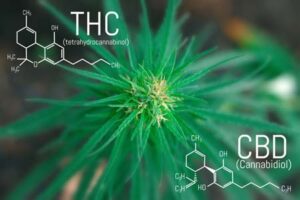By Barry Keate
Barry Keate, has lived with tinnitus over 40 years and has published 150+ research articles on numerous aspects of tinnitus. He is an expert on the condition and a well-known advocate for those with tinnitus.
Since the legalization of cannabis, in some form, in 33 US states, there has been an avalanche of interest into the medicinal uses of marijuana. Many claims have been made that it can alleviate or cure multiple medical conditions. Some of these claims are based on solid evidence while others are not. Although this is a hot topic, very few studies have investigated the effects of cannabis on hearing loss, hyperacusis, tinnitus and balance disorders. Now there are some early indications as to what effects cannabis may have on the hearing and balance system.
This article is largely based on the paper, “Cannabis and Hearing Care” by Dennis Colucci, AuD, and published, in two parts, in The Hearing Journal, July and August, 2019. (1) (2)
History and Use of Cannabis
Many ancient civilizations grew cannabis for fiber and seed production. They also used it for religious or medical use starting in Asia at around 2700 BC.
In the early 1800’s, it was found that cannabis extracts helped reduce the pain and vomiting of people who had cholera. By the late 1800’s, US doctors and pharmacists were prescribing cannabis extracts for nausea and stomach problems.
Recreational use of cannabis started after the Mexican Revolution in 1910 when marijuana, cultivated in Mexico, became available for smoking. Because of the psychoactive properties of the plant, cannabis was criminalized in the US in 1937.
In 1973, President Richard Nixon signed the Drug Enforcement Act as part of his “War on Drugs”. This made all cannabis products, including hemp and marijuana, illegal and stopped research into potential benefits. It was not until the 1990’s that the benefits of cannabis started to be explored.
Modern Day Uses of Cannabis
The two primary cannabis compounds in use today are tetrahydrocannabinol (THC) and cannabidiol (CBD). THC is the compound that gives the traditional “high” of marijuana,while CBD is non-psychoactive and does not give a high. Both are now being studied for their effects on human health and well-being.
Several systematic analyses, randomized trials, and observational studies include evaluations of THC and/or CBD on cases of multiple sclerosis, Alzheimer’s disease, autism, PTSD, inflammation, Parkinson’s disease, cancer and epilepsy. The US Food and Drug Administration (FDA) has approved the use of cannabis for chronic pain, nausea and vomiting related to chemotherapy, and appetite stimulation for patients with cancer or HIV. Furthermore, multiple studies have shown a reduction in opioid use following the introduction of cannabis.
CBD has been approved by the FDA for the treatment of refractory epilepsy. This is epilepsy that does not respond to typical pharmaceutical treatment. Over 50 million people worldwide have epilepsy and about a third of those have seizures that do not respond to treatment. In fact, the FDA has approved Epidiolex, a 99% pure oral CBD extract for use by children and adults with refractory epilepsy, because the addition of CBD has been proven to reduce seizure frequency.
In one of the largest clinical studies on cannabis usage and effects, over 3,000 people who used either THC or CBD reported on the severity of their symptoms before and 90 minutes after usage. Symptoms were organized in 27 categories, including back pain, sleep and depression. The participants reported and average improvement of 31.8%. According to study authors, THC products provided the greatest relief and smoking THC was the most widely used method.
The authors concluded that cannabis provides symptom relief and has both positive and negative side effects. There are short-terms risks to the use of THC, including functional safety issues, product toxicity and abuse, and various health concerns. However, unlike THC, CBD potency was not associated with side effects or immediate symptom changes. CBD is non-psychoactive, non-addictive, and well-tolerated with a good safety profile. No evidence shows that recreational use of CBD results in public health-related problems. However, in this study, CBD was less effective than THC in addressing participants symptoms.
Cannabis for Hearing Loss and Tinnitus
Only a few studies have looked into the use of cannabinoids for hearing loss, tinnitus and balance disorders and there is much more work to be done here.
One study examined the potential of cannabinoids to inhibit the action of a particular receptor (TRPV1) that responds to stimuli and causes pain and cellular injury. This receptor’s activation is responsible for the pathological development of cystitis (inflammation of the bladder), asthma, epilepsy, diabetes and hearing loss. The use of CBD as an inhibitor of this receptor may have clinically therapeutic potential.
Cisplatin is a powerful chemotherapy drug, which produces widespread hearing loss and associated tinnitus. Another study evaluated the use of cannabinoids in maintaining normal hearing in laboratory rats. They were given cannabinoids through transtympanic injections before being given cisplatin. These injections were given through the eardrum and the drug surrounded to cochlea, perfusing into it. The results showed hearing was protected from cisplatin damage.
Another study, with apparently opposite effects, was conducted on laboratory rats with prior hearing damage. This study showed cannabinoids may increase the occurrence of tinnitus in previously hearing-impaired rats.
There is obviously a great need for much more study in this area. Laboratory animals are used before trials on humans in order to determine safety, dosage and effectiveness. Results concluded in the laboratory frequently do not transfer to humans in the same way so large human studies are necessary.
So far, it seems that cannabinoids may be valuable in preventing hearing loss due to ototoxic medicines. This would be a tremendous advantage to millions of people who have to use medications that may damage their hearing. However, if hearing loss has already occurred, cannabinoids may worsen the condition and actually cause tinnitus
More will be known in the future.
References:
Get Free Shipping!
Order now and get free shipping on either the Tinnitus Starter Kit or Combo Pack. Try the doctor recommended products with clinically proven ingredients for tinnitus. No coupon code required.


